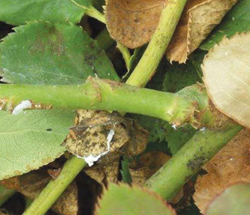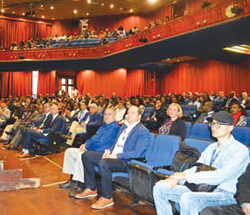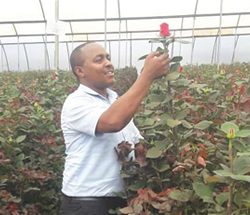Featured Past Articles

The Assignment
In September 2020, Silpack joined a group of pioneers who were tasked with transport of flowers by sea from Kenya to its main markets in Europe in an efficient and commercially viable manner.
In particular, Silpack was assigned to develop and manufacture suitable packaging for this exercise.
Why Silpack?
Silpack Industries Ltd, has been at the forefront of packaging development for flower transport in the last ten years, having developed an innovation center in Nairobi which is supported by its technical partners based in Sweden and the US.
Read more: Sea Freight for Flowers–The Packaging Voyage So Far
 Mealybugs are insects in the family Pseudococcidae and they are found in moist, warm habitat. Many of the common species are in the Pseudococcus and Planococcus genera.
Mealybugs are insects in the family Pseudococcidae and they are found in moist, warm habitat. Many of the common species are in the Pseudococcus and Planococcus genera.
Mealybugs damage plants with their toxic saliva, causing leaves to drop, inhibiting plant growth particularly of new shoots and creating yellow spots. Mealybugs can be difficult to treat because they hide in crevices where stems meet leaves and can reach damaging population levels rather quickly.
Life cycle
The life history of mealybugs varies depending on species. Their development progresses from egg to nymph, to adult. The Females may lay up to 600 eggs that are small, yellow and are a covered by a cottony mass. The long tailed mealy bugs don’t lay eggs but bear live young ones.
The female nymphs pass through three instars with a generation taking as little as one month depending on temperature. The female adults die shortly after laying all the eggs.
The Male nymphs pass through five instars. They don’t feed after the first two instars and their sole purpose is fertilizing the females.
It has been a decade of blossom for Molo River Roses Ltd since inception, and a beautiful milestone that seemed a hurdle during its establishment.
By Mary Mwende Mbithi

When a seed is planted, the sprouts exult the sower; the new shoots are his source of inspiration to nurturing the new plant to maturity until it brings forth good fruit. Thus, the farmer has every reason to celebrate his bumper crop. Similarly, achievements are a call for celebration. After years of toiling like a Trojan and working one’s fingers to the bone, success is the ultimate crown that underscores the results. It may take a long or a short duration but regardless of time, success is success. The wise man said ‘hurry, hurry has no blessings,’ but went on to say; ‘slowly but surely, the bird builds its nest.’ Before we could even rethink, he added that; ‘both the fast and the slow will meet each other on the ferry boat.’ In other words, success does not come with a timestamp. After years of toil and moil, it’s now ten years of success for Molo River Roses Ltd! “It has been a decade of blossom for Molo River Roses Ltd since inception, and a beautiful milestone that seemed a hurdle during its establishment. Eventually, it has birthed a success story- the story of a mega lodestar, a prestigious flower farm in Kenya -Molo River Roses Ltd, ” an elated Mr. Andrew Wambua, the Group General Manager said.

Over the last years, the Kenyan flower industry has grown rapidly. It is currently on of the country’s top industry after remittance and tourism and Kenya Flower Council’s (KFC) CEO Clement Tulezi believes the industry too can surpass tea in the next few years. However, there are several challenges, like freight capacity and rate, Kenya’s taxation regime and the EU-tightened plant health regulations, the industry needs to overcome. The team of KFC is doing their utmost best to enable the industry to do so, engaging with all involving relevant actors for new and improved solutions and alternatives.
Read more: The Three Major Challenges for Kenya’s Flower Industry

The 1979 film ‘Being There’, is the only screen performance for which actor Peter Sellers won an Oscar. Seller portrays a simple minded gardener turned from a sheltered existence into the harsh realities of life. Through a series of mishaps and misunderstandings, the gardener became a highly respected policy adviser to the president of United States.
The thinking on which the character builds his reputation and gains recognition as an authority is the simple philosophy that politics and business are very much like a garden-find or make the right sort of soil, plant it well, nurture it, feed it, and it will reward you well by providing for you year upon year.
IFTEX provides opportunities to engage with current and prospective buyers. It doesn’t matter whether you’re marketing a product or selling your new variety, an in-person presentation and short question based conversation afterwards can help you to close the deal quickly versus an email sharing the latest sales promo.

IFTEX has traditionally been a very popular exhibition to market your products, services and business. With advances in social media marketing and Internet technology, like webinars, Google hangouts and video conferencing, the value and benefits of marketing via trade fair comes up. Though technology is changing marketing at a rapid pace, there are several benefits from having exhibit presence at a trade show.
These six key benefits are why your business must have IFTEX Exhibition marketing presence:
1. IFTEX Creates Lasting Impressions If Done Right
The main purpose of IFTEX is to showcase a wide variety of options for attendees and business to engage and interact with each other. With a well-designed trade show booth that draws attendees’ attention, a few promotional items, a contest opportunity with giveaways and sales collateral, you will have a well-rounded booth experience that leaves an impression with a prospective customer for months. Consider having attendees enter a drawing by submitting a business card or completing an action on social media. These types of promotions serve dual purposes: increasing engagement and capturing potential contact information as well.
Read more: 6 Key Benefits IFTEX Show Has to Market Your Business

1. What experiences led you into agronomy, take us through the journey and your current role with Bayer East Africa, What do you enjoy most about working with farmers?
Agronomy started in my childhood since farming was the only way of living in our society where I was growing up. This led up me to pursuing a bachelor’s degree in Horticulture at JKUAT and started my career at Technoserve impacting growers with GAP knowledge. One thing led to the other and I found myself in Bayer as a technical assistant in horticulture sector and later joined the floriculture industry where I have grown through for 10 year to my current role of leading Floriculture and Export vegetables sector in Kenya. Farmers are the most patient people you will ever find, and out of this you can learn a lot from them. That’s why I enjoy working with the farmer.


